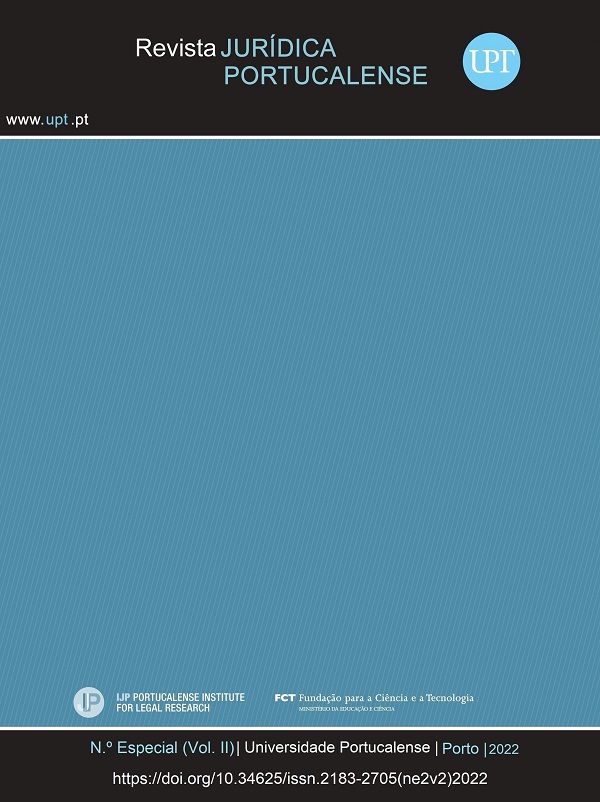Some considerations on the use of digital evidence in Labour Law
Keywords:
Labour Law; Digital evidence; Electronic document.Abstract
This communication briefly analyzes the use of digital evidence in the employment relationship, especially the one obtained through electronic messaging. Digital evidence is placed side by side with other means of evidence when it comes to the legal issues that labour courts are called to decide upon ‑ qualification of the contract; working time; overtime work; dismissal; termination of contract by other means, etc.. The use of digital evidence hence requires a closer scrutiny, since its use has become so important why the problem of using electronic documents as a means of proof is so important. In this work, we will review the main aspects on how to present this type of evidence in court, the legality of evidence collection methods and the value of the evidence obtained.
References
DRAY, Guilherme. Comunicações eletrónicas e privacidade no contexto laboral. In Direitos Fundamentais e de personalidade do trabalhador, 3.ª edição. [Em linha] Lisboa: CEJ, junho 2019, p. 78, disponível em http://www.cej.mj.pt/cej/recursos/ebooks/trabalho/eb_DireitoPersonalidade2019.pdf?id=9&username=guest, consultado pela última vez em 21 de maio, publicado originalmente no PDT, n.º II, 2016, pp. 103-129.
FIDALGO, Sónia. A utilização de inteligencia artificial no âmbito da prova digital – direitos fundamentais (ainda mais) em perigo. In RODRIGUES, Anabela Miranda, Inteligência artificial no Direito Penal, Coimbra: Almedina, 2020, pp. 129-162.
FONS CARBONELL, Margarita Rosa. Mensajería instantánea y redes sociales, la prueba en el proceso laboral. In QUINTANA PELLICER, Josep de; MIRÓN HERNÁNDEZ, Mar; PÉREZ DURÁN, Francisco (diretores). XXIX Jornades Catalanes de Dret Social Noves tecnologies i relacions laborals, 2.ª edição. [Em linha]. p. 294, disponível em http://cejfe.gencat.cat/web/.content/home/publicacions/jornades_catalanes/xxix_jornades_catalanes_dret_social.pdf, consultado pela última vez em 20/5/2021.
GARCÍA VITORIA, Ignacio. La protección de datos como eje de la jurisprudencia del Tribunal de Estasburgo sobre la privacidad del trabajador y el control empresarial. Revista catalana de dret públic, [Em linha]. 28 de fevereiro de 2018, disponível em https://eapc-rcdp.blog.gencat.cat/2018/02/28/la-proteccion-de-datos-como-eje-de-la-jurisprudencia-del-tribunal-de-estasburgo-sobre-la-privacidad-del-trabajador-y-el-control-empresarial-ignacio-garcia-vitoria/, consultado pela última vez em 20/5/2021.
MARTINS, João Marques. Documentos eletrónicos e meios de prova. In CORDEIRO, António Menezes (coord.). Código civil - livro do cinquentenário. Coimbra: Almedina, 2019. - Vol. I. - pp. 795-824.
MOREIRA, Teresa Coelho. Breve comentário à decisão do TEDH, de 5 de setembro de 2017 – Bărbulescu v. Romania. In Direitos Fundamentais e de personalidade do trabalhador, 3.ª edição [em linha]. Lisboa: CEJ, junho 2019, p. 54, disponível em http://www.cej.mj.pt/cej/recursos/ebooks/trabalho/eb_DireitoPersonalidade2019.pdf?id=9&username=guest, originalmente publicado no PDT, n.º II, 2017, pp. 143-158.
PRATA, Ana. Dicionário Jurídico, 4.ª edição, Coimbra: Almedina, 2005.
SALAS VELASCO, Ana C. La utilización de las tecnologías de la comunicación e información (TIC) y sus efectos en la práctica de la prueba en el processo. In QUINTANA PELLICER, Josep de; MIRÓN HERNÁNDEZ, Mar; PÉREZ DURÁN, Francisco (diretores). XXIX Jornades Catalanes de Dret Social Noves tecnologies i relacions laborals, 2.ª edição. [Em linha]. Disponível em http://cejfe.gencat.cat/web/.content/home/publicacions/jornades_catalanes/xxix_jornades_catalanes_dret_social.pdf, consultado pela última vez em 20/05/2021.
VASCONCELOS, J. O Contrato de Trabalho. 100 Questões. Lisboa: Universidade Católica Editora, 2004.
Downloads
Published
How to Cite
Issue
Section
License
Authors who published in the journal agree to the following terms:
- The Authors grant the Journal the right of first publication, and other non-exclusive publishing rights, licensed under the Creative Commons Attribution License which allows the sharing of work with recognition of its initial publication in this journal.
- Authors are able to take on additional contracts separately, non-exclusive distribution of the version of the paper published in this journal (ex .: publish in an institutional repository or as a chapter in a book), with an acknowledgement of its initial publication in this journal.
- Authors are permitted and encouraged to post and distribute their work online (eg .: in institutional repositories or on their website) at any point before or during the submission process, as it can lead to productive exchanges, as well as increase the impact and the citation of published work (See The Effect of Open Access).
RJP does not apply submission, publication or any other fees of any nature. Its articles are open access, with the goal of disseminating scientific knowledge and the debate of legal topics in the area of Legal Sciences.






